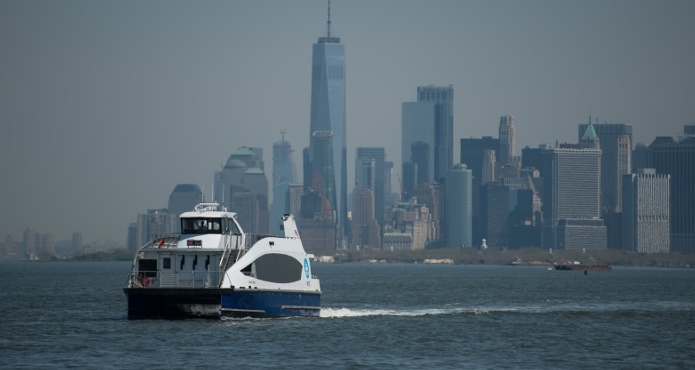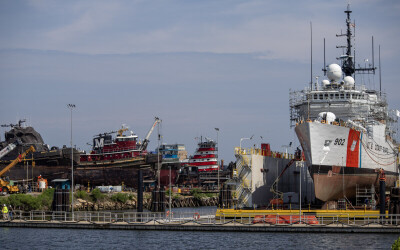Increasing subsidies plus an estimated $375 million to expand the New York City ferry fleet has budget watchdogs and some transit advocates pushing for tighter controls and higher fares on the NYC Ferry public system.
On Wednesday the New York City Council tabled a measure that would give the city Department of Transportation control of the ferry network, now operated by Hornblower under a contract with the city’s non-profit Economic Development Corporation. EDC staffers testified for two hours, as council members questioned whether the NYC Ferry benefits mainly higher-income commuters.
Launched in May 2017, NYC Ferry was an immediate hit, offering comfortable commutes around the city for $2.75, the same fare as the city subway. But that policy decision by Mayor Bill de Blasio’s administration to use the ‘one city, one fare’ standard for mass transit means the ferry system needs much higher public subsidies per rider than rail or bus.
“The ferry’s subsidies are high for two reasons: Its operating costs are high due to long routes and seasonal and leisure-oriented ridership, and its revenue is low because its fare is pegged to subway and bus fares,” wrote report author Sean Campion, a senior research analyst with the CBC. ”The recently announced expansion of NYC Ferry service will require even greater public subsidies — reaching as much as $24.75 per ride for the Coney Island route.”
The report came amid mounting criticism of the ferry system costs, which could total over $575 million at full build-out, according to the CBC report. On April 3, city Comptroller Scott Stringer weighed in with a call for the city to take direct control of NYC Ferry.
“The Economic Development Corporation’s contract with NYC Ferry operator Hornblower raises serious questions about the exploding costs and liabilities that the city is choosing to absorb, all while handing over millions in revenue to a private contractor — questions that to date have not been sufficiently answered,” said Stringer.
Stringer, a potential mayoral candidate himself, has criticized the EDC in recent months, including plans to spend $84.5 million on adding more vessels to the fleet. EDC officials defend the system, as de Blasio has, saying it has extended commuting options to long-underserved neighborhoods.
Stringer called for putting the NTC Ferry under jurisdiction of the city's DOT, which operates the Staten Island Ferry. Such a move would entail “eliminating administrative redundancies, allowing the city to keep all fare box and concession revenues, and providing a level of budgetary and operational transparency that EDC has to-date refused to provide,” Stringer contended.
The CBC report notes the NYC Ferry had an average per-trip operating cost of $13.83, more than twice as high as the Staten Island Ferry and the region’s private ferry operators. NY Waterway for example operates at an average $4.78 per trip, according to the report.
“NYC Ferry has higher operating costs because it serves long routes with low ridership and has a highly seasonal, leisure-oriented ridership pattern that leads EDC to charter additional vessels to meet peak demand,” the report explained.
Ferry advocates early on acknowledged the ferry would be subsidized at a higher rate, pointing to services such as the Long Island Rail Road with its $6 per-rider public subsidy. But at $10.73 now, the ferry is second only to city express buses subsidized at $11.79.
The level of subsidy has long rankled commuter activists who fault New York State and the city for not fixing the troubled subway system that strained to carry 2.7 billion riders in 2017 at a subsidy of $1.05 per trip.
Ironically, breakdowns and delays on the subway system and regional rail lines helped drive more people to try the NYC Ferry in its first summer, exceeding the EDC’s ridership estimates and triggering a scramble to charter other vessels and build more new boats.
The CBC report suggests the high rate of leisure travel on weekends could justify charging higher fares then to offset the cost of subsidies for daily commuters. Like other critiques, the report says NYC Ferry can be treated as a premium transit option, like express buses and the private ferries, to charge fares that are more in line with operating expenses.





